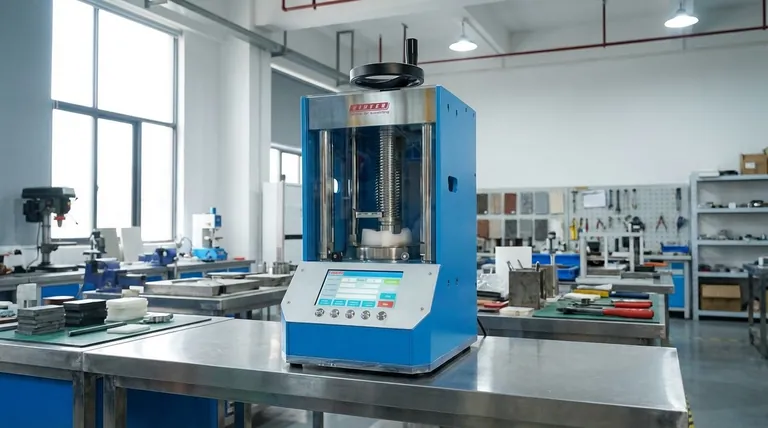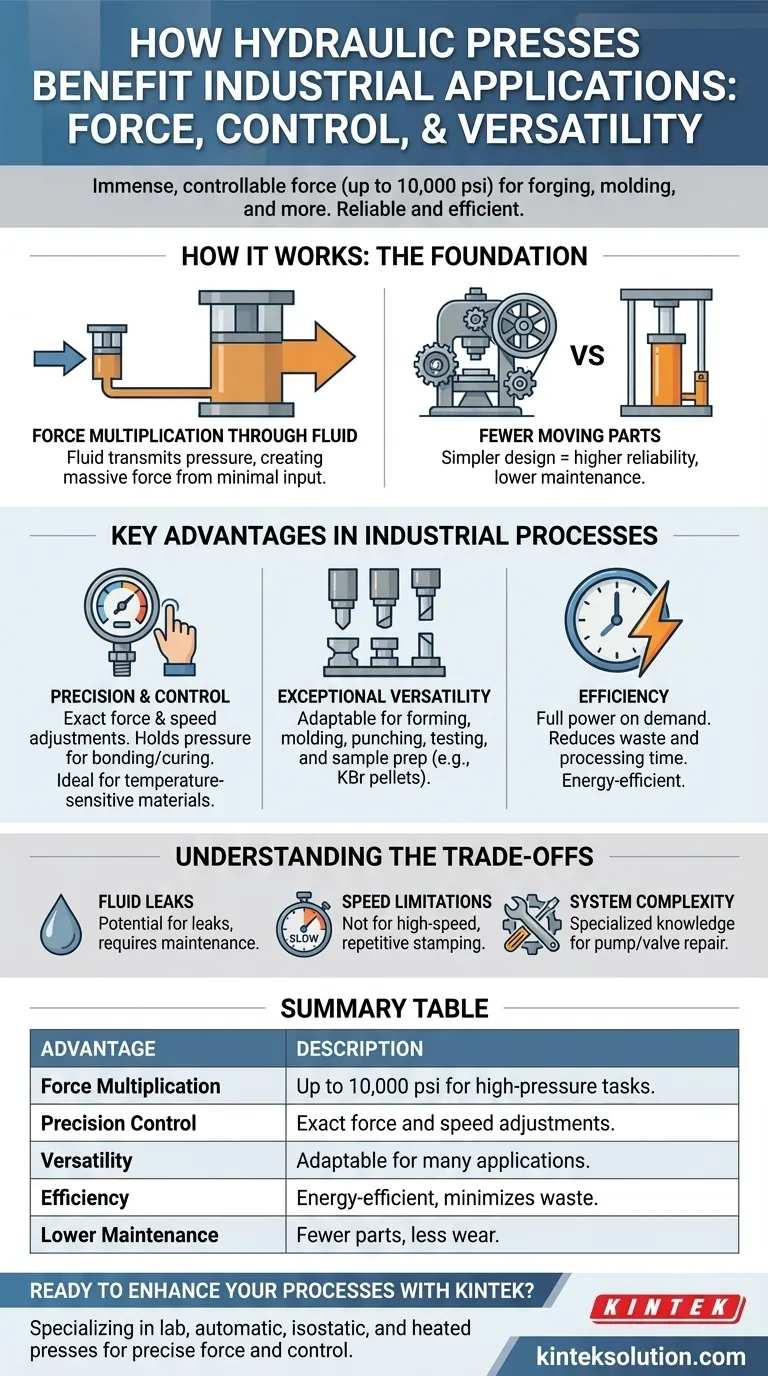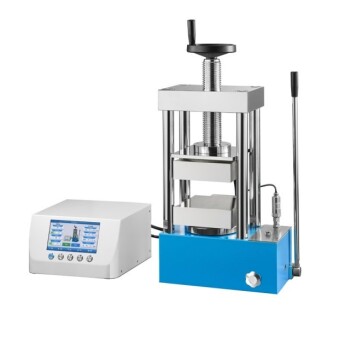In short, a hydraulic press benefits industrial applications by providing immense, controllable force in a reliable and versatile package. Using an incompressible fluid to multiply force, these machines can generate pressures up to 10,000 psi, making them exceptionally efficient for tasks like forging, molding, and crushing materials with high precision.
A hydraulic press's primary advantage is not just raw power, but the precise and consistent delivery of that power. Its design, which uses fluid to transmit force, results in a system with fewer moving parts, leading to superior control, versatility, and lower maintenance compared to mechanical alternatives.

The Foundation: How a Hydraulic Press Achieves Massive Force
The genius of the hydraulic press lies in its elegant application of fluid dynamics. This simple principle is the source of its most significant industrial advantages.
Force Multiplication Through Fluid
A hydraulic system operates by applying a small amount of force to an incompressible fluid (typically oil) in a small cylinder. This pressure is transmitted equally throughout the fluid, acting on a much larger piston. The result is a massive multiplication of the initial force, allowing the press to exert thousands of pounds of pressure with minimal input energy.
The Benefit of Fewer Moving Parts
Unlike mechanical presses that rely on complex systems of gears, flywheels, and clutches, a hydraulic press has a fundamentally simpler design. This leads directly to higher reliability, less wear and tear, and significantly easier and less frequent maintenance.
Key Advantages in Industrial Processes
The unique operating principle of a hydraulic press translates into tangible benefits across a wide range of manufacturing and testing environments.
Precision and Unmatched Control
Because the force is generated by fluid pressure, operators have a high degree of control over the ram's force and speed. The press can apply its full force at any point in the stroke and hold that pressure for an extended duration, which is critical for molding, bonding, or curing applications. When combined with heat, as in a hydraulic hot press, this precision is essential for processing temperature-sensitive materials.
Exceptional Versatility
A single hydraulic press can be adapted for a vast array of operations simply by changing the dies. Common applications include:
- Forming and Forging: Shaping and bending large metal parts.
- Molding and Compacting: Creating ceramic parts, compacting powders, and baling scrap material.
- Punching and Clinching: Assembling parts without fasteners or punching holes in thick materials.
- Testing: Performing compression tests on concrete or tension tests on components.
- Sample Preparation: In laboratories, they are used to create homogenous pellets (like KBr pellets for FTIR spectroscopy) for precise analysis.
Efficiency in Operation
The ability to deliver full power on demand makes hydraulic systems highly energy-efficient. Furthermore, the precise control helps minimize material waste by creating intricate shapes accurately. The combination of heat and pressure in a single machine also reduces overall processing time, improving throughput.
Understanding the Trade-offs
No technology is perfect for every scenario. To make an informed decision, you must be aware of the inherent limitations of hydraulic systems.
Potential for Fluid Leaks
The entire system is dependent on high-pressure fluid. Over time, seals and hoses can wear out, leading to leaks. A leak not only reduces efficiency but can also create safety and environmental hazards that require diligent maintenance to prevent.
Speed Limitations
For extremely high-speed, repetitive operations like rapid stamping, a mechanical press may offer faster cycle times. Hydraulic presses are unmatched in force and control, but they are typically not the fastest option for high-volume, low-tonnage work.
System Complexity
While the mechanical components are simple, the hydraulic system itself—with its pumps, valves, and fluids—requires specialized knowledge for troubleshooting and repair.
Making the Right Choice for Your Application
Ultimately, the decision to use a hydraulic press should be driven by the specific demands of your task.
- If your primary focus is maximum force and precise control for forming or molding: A hydraulic press is the superior choice, as it can apply and hold full force throughout its stroke.
- If your primary focus is high-speed, repetitive stamping of thin material: A mechanical press may provide the higher cycle rates you need.
- If your primary focus is versatile lab work or sample preparation: A benchtop or mini hydraulic press provides the necessary consistency and force control in a compact and safe form factor.
By understanding its core principles and trade-offs, you can leverage the hydraulic press as a powerful and adaptable tool for nearly any force-based application.
Summary Table:
| Advantage | Description |
|---|---|
| Force Multiplication | Uses fluid dynamics to generate up to 10,000 psi for high-pressure tasks. |
| Precision Control | Allows exact force and speed adjustments, ideal for molding and bonding. |
| Versatility | Adaptable for forging, molding, punching, and lab sample preparation. |
| Efficiency | Energy-efficient with minimal waste, improving throughput in operations. |
| Lower Maintenance | Fewer moving parts reduce wear and maintenance needs compared to mechanical presses. |
Ready to enhance your industrial or lab processes with reliable hydraulic press solutions? KINTEK specializes in lab press machines, including automatic lab presses, isostatic presses, and heated lab presses, designed to deliver precise force control and versatility for your specific needs. Whether you're forging, molding, or preparing samples, our equipment ensures efficiency and durability. Contact us today to discuss how KINTEK can support your laboratory and industrial applications!
Visual Guide

Related Products
- Automatic Laboratory Hydraulic Press Lab Pellet Press Machine
- Laboratory Hydraulic Press 2T Lab Pellet Press for KBR FTIR
- Manual Laboratory Hydraulic Press Lab Pellet Press
- Automatic Laboratory Hydraulic Press for XRF and KBR Pellet Pressing
- Manual Heated Hydraulic Lab Press with Integrated Hot Plates Hydraulic Press Machine
People Also Ask
- What is the purpose of creating pellets for XRF spectroscopy using a hydraulic press? Ensure Accurate and Repeatable Elemental Analysis
- How are hydraulic pellet presses used in educational and industrial settings? Boost Efficiency in Labs and Workshops
- How do hydraulic pellet presses contribute to material testing and research? Unlock Precision in Sample Prep and Simulation
- How do hydraulic press machines ensure precision and consistency in pressure application? Achieve Reliable Force Control for Your Lab
- What are the advantages of using a hydraulic press for pellet production? Achieve Consistent, High-Quality Samples



















